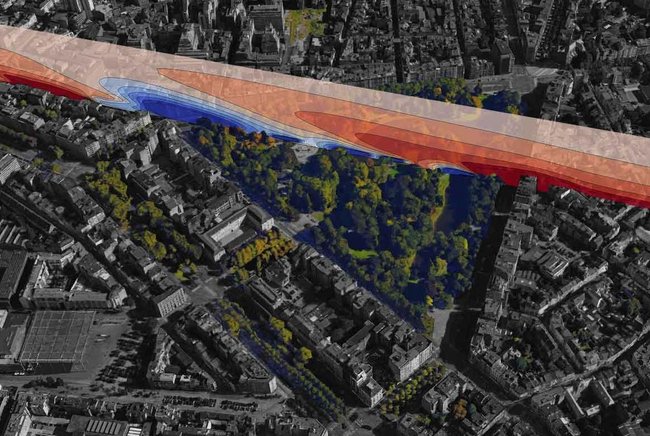Research towards climate design of cities receives a Dutch and European prize
Toparlar’s model can help to design energy efficient buildings.

Yasin Toparlar, who received his doctorate cum laude from the departments of The Built Environment and Applied Physics in April 2018, gets two prizes for his thesis in the field of fluid mechanics. Today he receives the KIVI Hoogendoorn award and in September the ECCOMAS award (European Community for Computational Methods in Applied Sciences), for his thesis on modeling the urban heat island effect on energy consumption of buildings.
Buildings account for around 40% of global energy consumption. An energy-efficient building is typically designed by making changes to the building itself. The model developed by Toparlar, however, takes the urban microclimate more into account and how this affects the building. A lot of energy can be saved by applying that knowledge during city planning. Toparlar’s model can therefore help to design cities with optimal microclimates, where buildings act as energy efficient as possible.
The urban heat island effect
The demand for energy for buildings depends on various factors, such as occupant behavior, building installations and the materials. For buildings in cities there is an extra factor: the urban heat island (UHI) effect. In a city the temperature is generally higher than in the surrounding rural areas. Since the UHI effect increases the temperature in cities, this leads to higher energy consumption for summer cooling.
In his thesis, Toparlar used numerical approaches such as computational fluid dynamics (CFD) and building energy simulation (BES) to simulate the current and future climate of cities. He calculated the energy required for cooling, while taking into account wind, convection and radiation. Toparlar tested his model in Rotterdam and Antwerp and it proved to be very accurate in relation to measured temperatures.
KIVI Hoogendoorn and ECCOMAS Award
Toparlar will receive the KIVI Hoogendoorn Award today on May 22 during the Burgers conference. The Charles Hoogendoorn Award is an annual Dutch prize for the best dissertation in fluid dynamics. The prize was awarded for the first time in 2014. In that year TU/e alumnus Güneş Nakiboğlu won the prize.
Next to that, in September the ECCOMAS Award will be granted to Yasin Toparlar at a conference in Krakow. ECCOMAS has established the Award for best thesis to highlight outstanding achievements of young scientists at the start of their scientific career. In the ECCOMAS news item, the international jury says: “Yasin Toparlar used with outstanding rigor the tools pertaining to our scientific community in an original problem with relevant social impact.” It is 6 years ago that a Dutch entry won the ECCOMAS award. In 2012, Erica Coenen won, who also did her PhD research at TU/e.
Successful cooperation
Yasin Toparlar: "Certainly, I am extremely honored with these two prestigious awards. I think PhD research requires quite some curiosity, dedicated hard work, and continuous improvement. Only when it receives many positive feedbacks and when you win awards from leading organizations in your field of research, you realize what a great journey it had been. I was supervised by researchers who are the best in their fields. That undoubtedly was very crucial for the success of my research work.”
His promotors Bert Blocken and Gert-Jan van Heijst are very proud of their former PhD candidate: “These are two very prestigious awards for a young PhD graduate, at national and European level. The more so because they are awarded by two leading organizations and jury members that are world leaders in the field of fluid mechanics and computational modeling. Yasin Toparlar is an outstanding researcher but we also would like to stress the successful collaboration between the departments of The Built Environment and Applied Physics at Eindhoven University of Technology and with VITO in Belgium that together designed this very innovative and interdisciplinary research project.”
Yasin Toparlar is currently working at the Dutch consultancy firm Deerns as a project leader on data analytics and smart buildings.